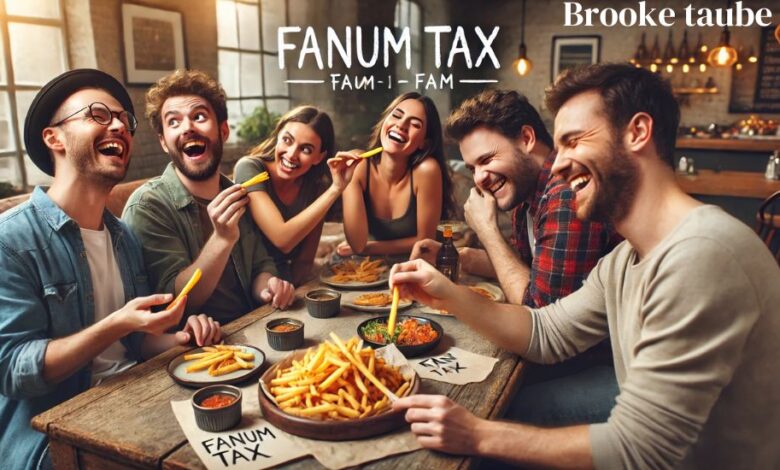Fanum Tax Meaning What Does Fanum Tax Really Mean?

In recent months, the term “Fanum tax” has gained popularity across social media platforms, especially on TikTok and Twitch. For those unfamiliar with the phrase, its usage might seem confusing at first. However, Fanum tax meaning is simple yet humorous in nature, stemming from a viral trend that originated from online content creators. In this article, we will explore the Fanum tax meaning, its origins, and why it has become such a widely recognized term among the younger generations.
Table of Contents
ToggleWhat Is the Fanum Tax Meaning?
At its core, Fanum tax meaning refers to the act of taking food from a friend without asking—essentially claiming a portion of their meal in a playful manner. The term is derived from Twitch streamer Fanum, who is part of the AMP (Any Means Possible) content collective. During one of his live streams in December 2022, Fanum was caught on camera taking cookies from his fellow streamer and AMP member Kai Cenat without asking. This act became a running joke among AMP fans and streamers, who started calling it the “Fanum tax.”
The Fanum tax meaning is rooted in the playful behavior of taking something from a friend while framing it as a “tax” that one has to pay, typically in the form of food. The concept is similar to the long-standing sibling or dad “food tax” joke where one person takes food from another, usually a family member or friend, and calls it a tax.
The Origins of Fanum Tax Meaning
The Fanum tax meaning finds its origins in AMP’s live streams, where the members regularly interact in humorous and light-hearted ways. The initial moment that led to the term occurred during a holiday-themed live stream, where Fanum barged into Kai Cenat’s room and took his cookies. This moment was so entertaining that fans of the stream began referring to it as a “tax” whenever Fanum would take food from others. From there, the term spread quickly among viewers, who found the idea of a “Fanum tax” amusing.
As AMP’s popularity grew across platforms like YouTube and Twitch, so did the use of the term “Fanum tax.” Fans began using it not only when watching the streams but also in their daily lives. By mid-2023, the phrase had become popular on social media, especially TikTok, where parody videos and memes centered around Fanum tax meaning began to appear.
Fanum Tax and Its Meme Culture
As with many modern slang terms, Fanum tax meaning eventually crossed over into the realm of internet memes. The phrase gained traction among Gen Z and Gen Alpha, two generations known for their love of humor, sarcasm, and memes. Young people began using the term both ironically and seriously when interacting with friends, particularly when food was involved.
For example, someone might shout “Fanum tax!” before taking a fry from their friend’s plate. The humorous part of the Fanum tax meaning lies in the casual yet exaggerated claim of ownership over something as trivial as a piece of food. Many TikTok users have also contributed to the spread of the term by creating parody videos where they mimic someone declaring a “Fanum tax” in exaggerated scenarios.
In fact, the term became so popular that a viral song was created in late 2023, further boosting the Fanum tax meaning across TikTok. The song, titled “Sticking Out Your Gyat for the Rizzler,” features lyrics that reference various trendy slang terms, including “Fanum tax.” This song became an anthem of sorts for the younger generation, who embraced the playful and lighthearted nature of these new slang terms.
How Fanum Tax Meaning Evolved on TikTok and Twitch
TikTok has played a significant role in shaping the Fanum tax meaning and bringing it to a wider audience. As with many viral trends, Fanum tax meaning evolved from being a simple joke between friends on a live stream to a widespread cultural reference that resonates with younger audiences. TikTok users have posted countless videos where they “tax” their friends’ food, often yelling the phrase “Fanum tax” before doing so. This playful act has become synonymous with bonding over humor and shared experiences.
The widespread use of the term has made it not just a joke within the AMP community, but a common slang used by teens and young adults across various platforms. Its association with viral content, especially TikTok memes and videos, has only amplified the popularity of the term.
Why Has Fanum Tax Meaning Gained So Much Popularity?
There are a few reasons why the Fanum tax meaning has resonated so deeply with younger generations. For one, the concept of taxing someone’s food is relatable to anyone who has ever shared meals with friends or family. The playful nature of the phrase makes it easy to use in casual social settings, and it carries a certain level of lightheartedness that appeals to those who enjoy humor based on everyday interactions.
Moreover, the spread of Fanum tax meaning has been propelled by the influence of AMP, a group of content creators who have amassed millions of followers across platforms like YouTube, Twitch, and TikTok. The personalities of AMP members, including Fanum, have helped elevate the phrase to meme status, where it continues to be referenced and used in various forms of content.
Additionally, the virality of the song “Sticking Out Your Gyat for the Rizzler,” which includes the phrase “you’re so Fanum tax,” has further solidified the term in popular culture. The song’s playful use of modern slang terms has made it a hit among Gen Z and Gen Alpha audiences, who enjoy using and parodying trendy phrases like Fanum tax meaning.
Fanum Tax Meaning in Everyday Conversations
Today, Fanum tax meaning has transcended its origins and has become a part of everyday conversations, especially among younger generations. People use the term in a variety of contexts, whether they are physically taking food from a friend or simply joking about the concept of “taxing” someone’s belongings. The phrase is often used in a playful and non-serious way, allowing friends to bond over humor.
For example, someone might say, “You have chips? Time for the Fanum tax!” before playfully reaching for their friend’s snack. This use of the phrase highlights its role as a modern-day slang term that embodies both humor and relatability.
Conclusion
The rise of the term Fanum tax meaning is a testament to how internet culture and viral content can shape the way we communicate. What began as a simple, humorous act on a Twitch live stream has evolved into a widely recognized term that is now part of the everyday vocabulary of many young people. Whether used seriously or in jest, the Fanum tax meaning serves as a reminder of the playful nature of human interactions and the power of shared experiences, especially when it comes to food.
As the popularity of AMP and its members continues to grow, it is likely that the Fanum tax meaning will remain a cultural reference for years to come. From its origins on Twitch to its viral status on TikTok, this slang term is a perfect example of how modern lingo is created and spread in the digital age.



